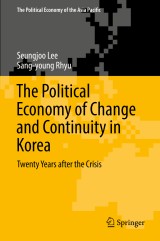Details

The Political Economy of Change and Continuity in Korea
Twenty Years after the CrisisThe Political Economy of the Asia Pacific
|
90,94 € |
|
| Verlag: | Springer |
| Format: | |
| Veröffentl.: | 25.08.2018 |
| ISBN/EAN: | 9783319714530 |
| Sprache: | englisch |
Dieses eBook enthält ein Wasserzeichen.
Beschreibungen
This book analyzes the transformation of Korean political economy since the 1990s. In the wake of the Asian financial crisis of 1997, the political economy of South Korea has evolved around two diametrically opposed features: convergence into the Anglo-American model and the state-led strategic restructuring of industries. To unravel the peculiar nature of the political economy in Korea, the authors first identify major factors that contributed to the dual dynamics of change and continuity in Korea: external pressures, ideological shift in political leadership, and the pivotal role of the Korean government. Next, they examine the way in which these factors interacted with each other to reshape the evolutionary path of the Korean political economy. Using several case studies, the authors take us through the stages of this transformation, from the reform of the chaebols to the industrial restructuring of the auto, IT, and aerospace industries to the rise of South Korea’s Free Trade Agreements (FTA) initiative. In explaining the role that the dual dynamics of change and continuity play in modern Korean political economy, this book makes an important contribution to the existing literature and will be of interest to scholars and policy-makers concerned with development in Korea and the Asia-Pacific.
Ch. 1 Introduction.- Part I Governance Reform.- Ch. 2 Chaebol Reform And The Dynamics Of Institutional Change.- Ch. 3 The Corporate Governance Reform Of Newly Privatized Firms.- Ch. 4 The Paradox Of Legalization And Informal Networks.- Part II The Political Economy Of Industrial Restructuring.- Ch. 5 Globalization And The Transformation Of Production Networks In The Auto Industry: The Case Of Hyundai Motors.- Ch. 6 The Political Economy Of Cooperation And Competition In The It Industry: The Dynamics Of Self-Reinforcing Mechanism.- Ch. 7 The Restructuring Of The Aerospace Industry: The Interplay Between The Government And Private Corporation.- Part III Foreign Economic Policy.- Ch. 8 The Evolution Of FTA Policy In Korea: Toward A Hubbing Strategy.
Seungjoo Lee, Assistant Professor at Chung-Ang University (Seoul, Korea), is a comparative political economist interested in U.S.-Japan trade disputes over high technology industries, political dynamics of informal networks in Japan and Korea, political bias in redistributive policy, and the transformation of the developmental state in the age of globalization. He has previously served as an assistant professor at the National University of Singapore and Yonsei University. He has also worked with BASC as a postdoctoral fellow where he focused on bilateralism in trade in Asia. As a regional specialist with expertise in Korean, Japanese, American, and Singaporean political economy, he currently investigates the divergent FTA strategies of East Asian countries.
This book analyzes the transformation of Korean political economy since the 1990s. In the wake of the Asian financial crisis of 1997, the political economy of South Korea has evolved around two diametrically opposed features: convergence into the Anglo-American model and the state-led strategic restructuring of industries. To unravel the peculiar nature of the political economy in Korea, the authors first identify major factors that contributed to the dual dynamics of change and continuity in Korea: external pressures, ideological shift in political leadership, and the pivotal role of the Korean government. Next, they examine the way in which these factors interacted with each other to reshape the evolutionary path of the Korean political economy. Using several case studies, the authors take us through the stages of this transformation, from the reform of the chaebols to the industrial restructuring of the auto, IT, and aerospace industries to the rise of South Korea’s Free Trade Agreements (FTA) initiative. In explaining the role that the dual dynamics of change and continuity play in modern Korean political economy, this book makes an important contribution to the existing literature and will be of interest to scholars and policy-makers concerned with development in Korea and the Asia-Pacific.
<p>Analyzes the post-Asian financial crisis political economy of South Korea, characterized by the dual dynamics of change and continuity</p><p>Examines the way in which external pressures, ideological shifts in political leadership, and the institutional transformation of the Korean state combined to produce the current political and economic climate</p><p>Uses case studies to illustrate various stages in the economic and political development of the modern Korean state?</p>
Diese Produkte könnten Sie auch interessieren:

Enabling Social Europe

von: Katharina Mader, B. Maydell v., K. Borchardt, K.-D. Henke, R. Leitner, R. Muffels, M. Quante, P.-L. Rauhala, G. Verschraegen, M. Zukowski

53,49 €















